
16 minute read
Knauf 16 Hydroscand
Knauf welcomed Lucy Hall as Sustainability Leader in September. Lucy will partner with all areas of the business from manufacturing to specification and sales to develop a robust sustainability strategy.
Lucy has a wealth of experience and awards in the areas of sustainability and innovation.
Advertisement
Her expertise will help Knauf to advance its sustainability agenda at a time when product manufacturers are shouldering increasing environmental responsibility.
As part of these ongoing sustainability endeavours, Knauf is making the move to recycled plastic packaging. The Company’s new packaging will contain at least 30% recycled plastics and is often also recyclable at the end of its life so the circle can be continued.
The Company has added easy to recognise logos to the packaging to identify when it has been made from recycled plastic, and if it is recyclable. Knauf will start by changing the packaging of key products within its portfolio and continue the move for other products over the coming months. The Company is using Post-Consumer Recycled (PCR) plastics – materials which have been used by consumers, recycled and given a new life. Lucy gives an insight into the importance of the new packaging: “Our Product Manager, Becky Newell, has worked collaboratively and consistently to achieve Knauf’s goal of improving the recycled content of our packaging. Realising her goal to make a difference on a bigger scale, the recycled content of plastic packaging will now also be high on the agenda of new product development. This is a fantastic achievement in Knauf’s drive to fulfil its sustainability goals.” Greenhouse gas emissions are associated with single-use plastics, and the National Geography Society estimates that more than 40% of plastic is used just once and that there are more than 5 trillion pieces of plastic in the ocean. This is a significant reason for Knauf adopting PCR plastics and a recognition of the Company’s commitment to Build for the World We Live In.
This switch will see some small changes to the appearance of product packaging, such as a grey rim and base. This is simply due to a number of different coloured plastics being recycled to make a new product, and not adding in unnecessary dyes.
Knauf puts sustainability top of the agenda
Knauf UK & Ireland is committed to a high standard of sustainability and has intensified its efforts over recent months with the appointment of a new Sustainability Leader and the implementation of several initiatives to reduce the environmental impact of its products.
It is important to note that it is just the packaging that is changing, not the product, so customers can rest assured knowing they’re still getting the same, trusted Knauf product. Another change being made to the Knauf portfolio to lessen its environmental impact is on the GIFAbond flooring adhesives range. These products are used when installing Knauf GIFA FHB and Hugo floorboards. From January 2022 the product range will be EC1 Plus Emicode certified.
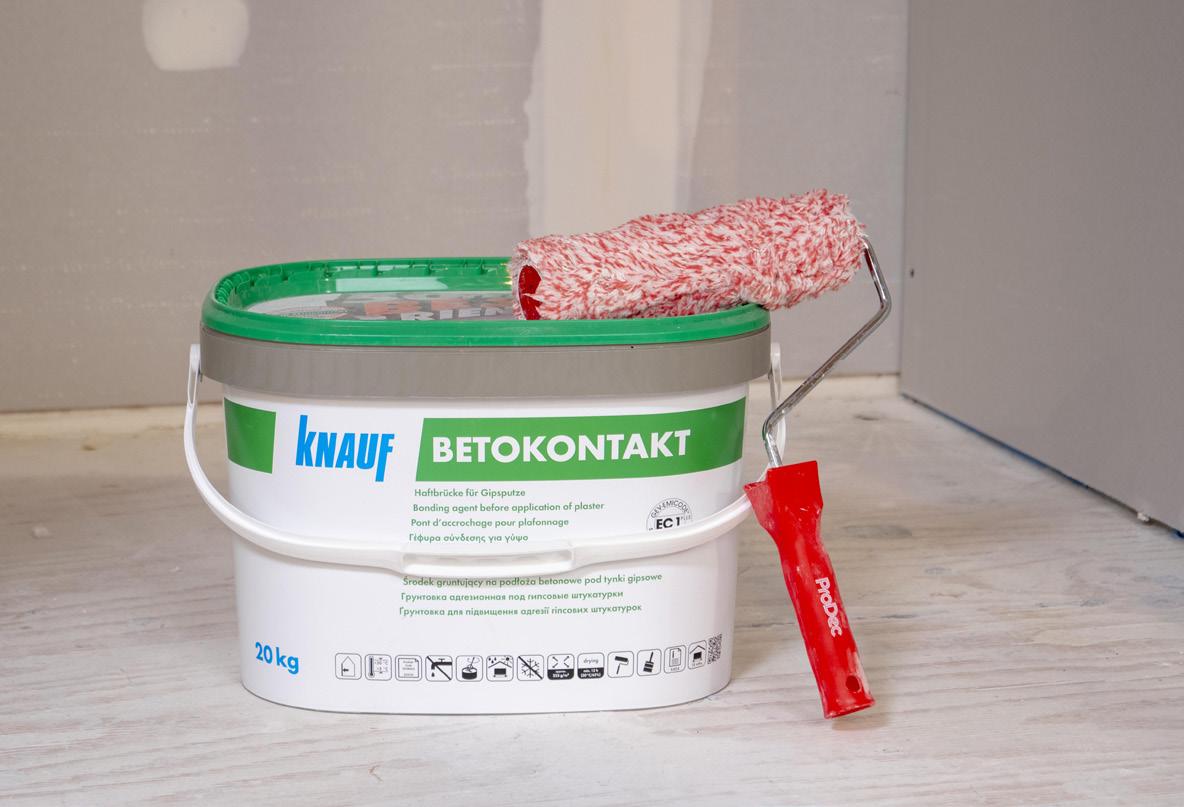
The Emicode certification rates flooring adhesives and installation products into three categories. Knauf has achieved the highest possible rating of EC1 Plus, very low emission, defined as ‘the limit of what is technically feasible today’. To achieve this rating, the products must undergo rigorous testing with limits on VOCs, formaldehyde, acetaldehyde and other hazardous substances which can affect indoor air quality and health. The Knauf EC1 Plus Emicode certified products will be GIFAbond Uno, a joint adhesive foil which is used with an application gun to the tongue and groove edge; GIFAbond Blue, a single layer joint adhesive in an easy to use bottle for hand application, and GIFAbond Duo, a surface adhesive used on two-layer systems. It is not just its product range that Knauf is reviewing. The Company has recently rolled out fourteen new forklift trucks at its Sittingbourne plant bringing improved safety, greater management control and cleaner operation. In addition to having the latest safety features the new trucks are powered by Liquid Petroleum Gas (LPG). This means they are much cleaner, producing far less particulate pollution than diesel and emitting much lower levels of CO2.
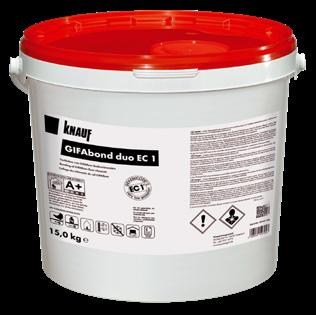
Knauf is also working with its distribution partners to provide customers with a more environmentally friendly delivery option. One of its key distributors, Nicholls Transport, Winner of the Greenfleet Fleet of the Year award 2020, was among the first operators in the UK to use LNG trucks and has recently been recognised as an IVECO Ambassador for its Green Logistics Operation. These initiatives are part of Knauf’s ongoing sustainability programme and tie in with its ‘people, planet, prosperity’ ethos. Sustainability considerations are becoming more prevalent across the construction industry and Knauf is keen to lead the way in meeting customers’ expectations for environmentally friendly products. For further information visit
www.knauf.co.uk
Monster Mesh
www.monster-mesh.co.uk
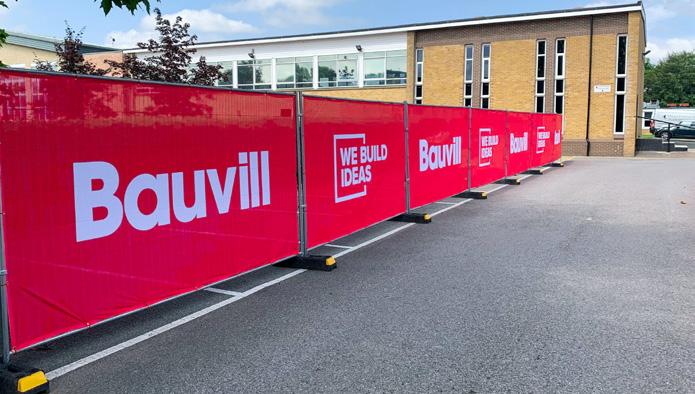
Established in 2018, Monster Mesh has worked in the event and construction branding sector since inception and is now an established market-leader in this field.

Their friendly and approachable nature, combined with expert design solutions tailored to individual needs means they have grown year on year, impressing customers with their quality of service.
The company specialises in the supply of large format print products, including custom designs for Heras fence covers, PVC & ACM hoarding panels, PVC and mesh banners, large scale scaffold wraps and more helping increase brand visibility in venues or construction projects. These products also have longevity, with the premium Heras fence cover proving popular for long projects as well as its potential for re-usability. Each is compatible to fit all brands of temporary fencing and include free delivery on fence covers.
Much of Monster Mesh’s business comes from business exhibitions, venues, festivals, events and construction, with the later booming in 2021, despite the reduction in many other outdoor events.
Monster Mesh has been working incredibly hard to maintain their high results, going so far as having their record year in 2021.
This has been down to a number of factors, including a focus on brand strengthening and continual digital marketing efforts. The business has also added several new products to their site, generating more interest and a broader choice for customers.
The business has proved to be a popular choice for clients since its launch, due to their commitment to ‘good old fashioned’ personal customer service. This personal service means that clients can be confident in their decisions, having the ability to browse online before speaking directly to one of the team to discuss any particular requirements. Founder of Monster Mesh, Mark McLennan is committed to maintaining this service with all construction products, complete with a team that are always happy to help advising and talking through options.
This commitment to service also includes free design and artwork for products, ensuring the highest quality products and personalisation.
We spoke to Mark who stated,
“2021 was our busiest year ever despite restrictions and we have grown our customers in the construction sector considerably. It’s great to see the construction industry to boom and the sector is certainly doing its bit to move things forward. Our growth has been down to more customers with repeat business and recommendations, as well as increasing our focus on building the Monster Mesh brand and securing our place in the industry.”


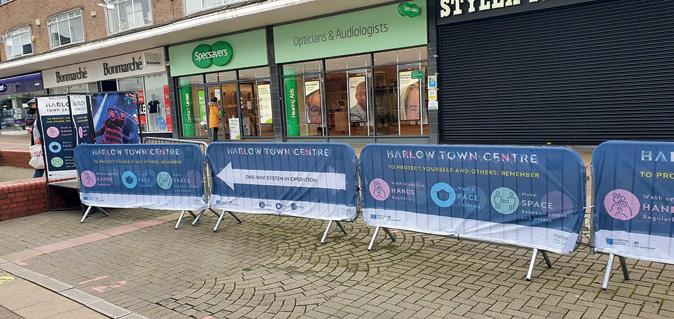
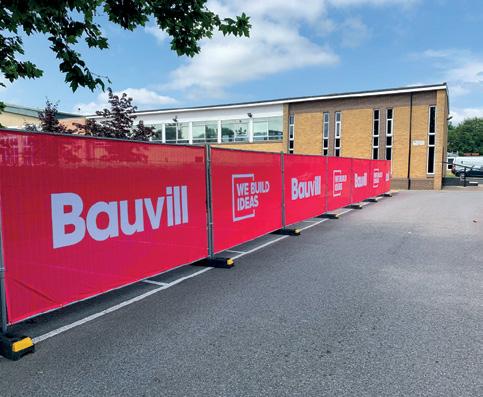
First of its kind
made possible within the Bucket Bundie range.
- Diesel And AdBlue Bucket Bundie for J A Jackson
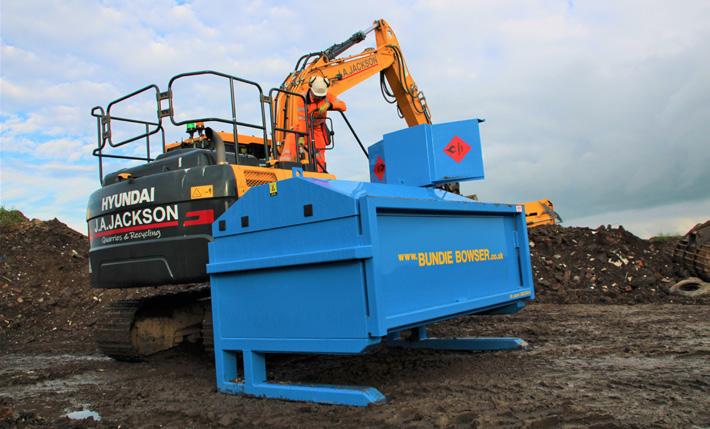
Established in 1967, J A Jackson Quarries & Recycling Ltd are a family run business who supply quarried and recycled aggregates. Providers of sustainable building materials, aggregates and ready-mix concrete, the company also provide domestic and commercial skip hire and have a fully licenced waste transfer station and facilities for inert tipping. J A Jackson operates a fleet of more than 20 tippers, artics, skip wagons and concrete mixers.
The company’s quarries in Preston,
Leyland and Lancaster are all within easy reach of the region’s motorway network making access and distribution as efficient and effective as possible.
J A Jackson have recently added the first combined Diesel / AdBlue
Bucket Bundie Fuel Bowser to their fleet provided by manufacturers,
Ace Plant.
Ace Plant, home of the ‘Bundie Bowser’ fuel storage range, are a plant hire and sales company based in Buckinghamshire who utilise their engineering roots to manufacture Fuel Storage Solutions and Dust Suppression equipment for hire and sale throughout the UK. Based on the same concept as the patented Bucket Bundie Fuel Bowser, Ace Plant’s Bucket Bundie Store was seen shortlisted in the Institute of Quarrying’s Excellence Awards in the knowledge and innovation category - a fantastic accolade for the ‘Bundie Bowser’ name.
Ace Plant have recently launched the first Bucket Bundie that is capable of carrying both Diesel and AdBlue at the same time. This capability can already be seen in Ace Plant’s static, site tow and road tow ranges but has finally been J A Jackson first found out about the Ace Plant Bucket Bundie Bowser after searching the internet about fuel bowsers. They liked the fact that the Bucket Bundie can be transported by existing site machinery without the need for a tractor. These units remove the need for lifting chains as well as the need for the operator to leave the safety of the machine’s cab to attach any chains. It features a patented bucket loading system with special slots above the support legs that allow a wheel loader operator to easily pick up and move the bowser using the machine’s front bucket. With the loader bucket crowded back, the Bucket Bundie is held securely for safe transport across rough ground – this combination works much better than a towed bowser which can be difficult to move and reverse – particularly on rough terrain. J A Jackson say that the Bucket Bundie will be a benefit to their business as the unit will result in “less risk of contamination and we no longer need to use the 5 gallon drums”. In turn, this also makes refuelling a faster and safer processes with less risk of spillage. The Bucket Bundie Bowser is available in three different capacities: 450L, 1000L & 2250L.
To find out more visit www.aceplant.co.uk or call 01908 562191.
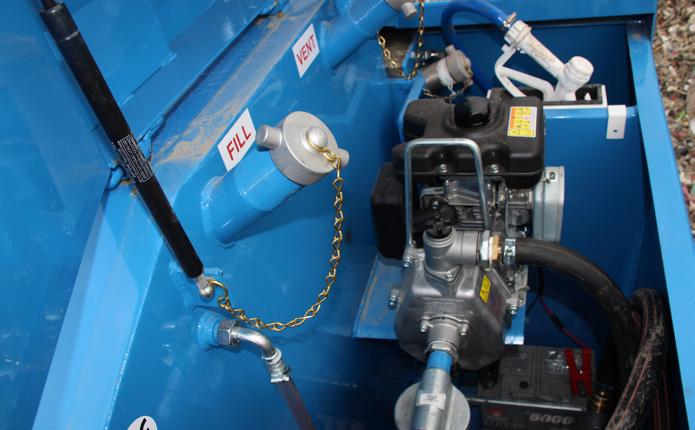

Data Centres Specify KPS High Density Polyethylene (HDPE) Piping & Fibrelite Composite Access Covers To Safeguard 24/7 365 Operation
In an increasingly connected digital world, data centres are critical. With 3.6 million m2 in use by data centres in Europe alone and over 70 projects (851,000 m2) in progress in 12 European countries
(ResearchAndMarkets1), their growth
continues to accelerate to meet the needs of cloud technology, AI, 5G, Internet of Things (IoT) data storage and the shift to hybrid working. This trend is mirrored globally, with investment in data centres projected to rise from $244.74 billion in 2019 to $432.14 billion in
2025 (ResearchAndMarkets2).
Safeguarding Service. Eliminating Downtime.
To ensure 24/7 365 operation and minimise the risk of downtime, data centres are constructed with the highest performance, highest quality building materials available, with every part of a facility meticulously planned. Infrastructure is an integral part, normally comprising of an Uninterruptible Power Supply (UPS), power distribution, cooling systems, fire systems and security systems, many of which have redundancies (2N+1 for Tier 4 facilities, guaranteeing 99.995% uptime) including back-up power generators to prevent interruption of service. Two contemporary products being adopted by leading data centres across the globe are Fibrelite’s lightweight FRP composite trench access covers (to protect and provide easy access to underground infrastructure) and KPS’ HDPE piping (to fuel backup generators).
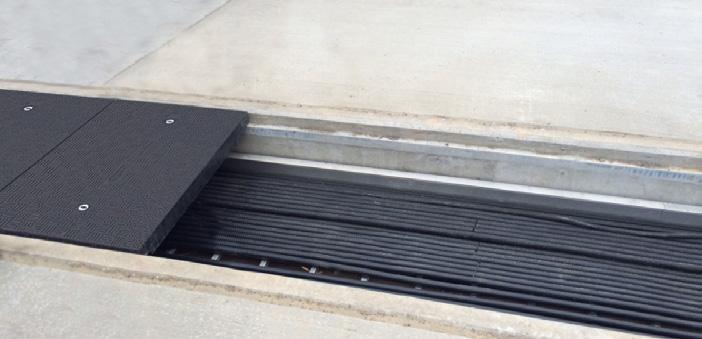
High-Performance Backup Generator Fuelling Systems.
A reliable fuel supply is key to backup generators’ smooth operation, connecting generators to fuel storage tanks and tanks to fill points. Nicolas Lefebvre, Generator Activity Manager at Flipo-Richir (France) commented “We regularly install generators to back up data centres in the event of a power cut. We have been using KPS double wall piping exclusively for more than 10 years to connect generators to underground storage tanks. KPS piping is easy to install, mainly thanks to the assembly by thermo-welding, and the range of products is very complete, which makes it possible to create any type of network, even complex.”
Corrosion-resistant, safe and easy to install (due to compact electrofusion fittings) the KPS HDPE piping
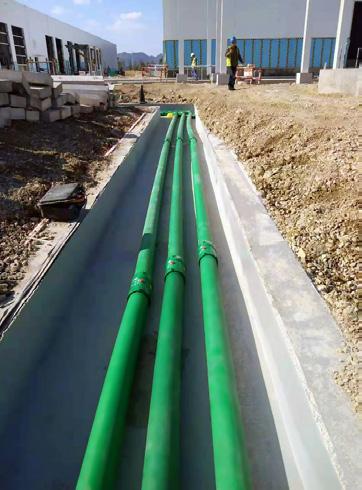
KPS’ HDPE piping installed at major Parisian data centre

system helps fuel flow safely, even providing protection against ground movements (using the elasticity and flexibility of HDPE). Safety can be enhanced further by installing KPS’ conductive piping option, ensuring continuous conductivity between the tank and the end of the line (which can be earthed). This helps to prevent the accumulation of electric charges that could otherwise be created by the friction of the fuel velocity and the plastic inner surface. KPS’ 4” (110mm) piping also delivers a 933 litre/minute flow rate, making it ideal for fill lines (KPS piping is available in 1” to 4” diameters in single or double wall). KPS will also soon be releasing a 6” double wall product range.
Simple, Safe Underground Infrastructure Access.
Another contemporary product line seeing widespread global adoption by architects, design engineers and specifiers to enable easy access to underground infrastructure is Fibrelite’s modular FRP composite trench/channel access covers. These are now often specified at the outset of new build data centre projects. Bespoke, modular and lightweight, Fibrelite covers are designed to be removed quickly and easily by two people using Fibrelite’s ergonomically designed lifting handles, even where heavier load ratings are required (e.g. channels running between buildings with vehicle traffic).
Due to their unique custom engineering capabilities, Fibrelite can manufacture access covers at all load ratings up to F900 / 90 tonne (A15, B125, D400, E600 and F900). Traditionally, for the past 100 years, access covers have been made from concrete or metal which are 3-4 times the weight of Fibrelite covers, often requiring specialised lifting equipment to remove and replace. Fibrelite covers are also impervious to corrosion and have a unique antislip walking surface.
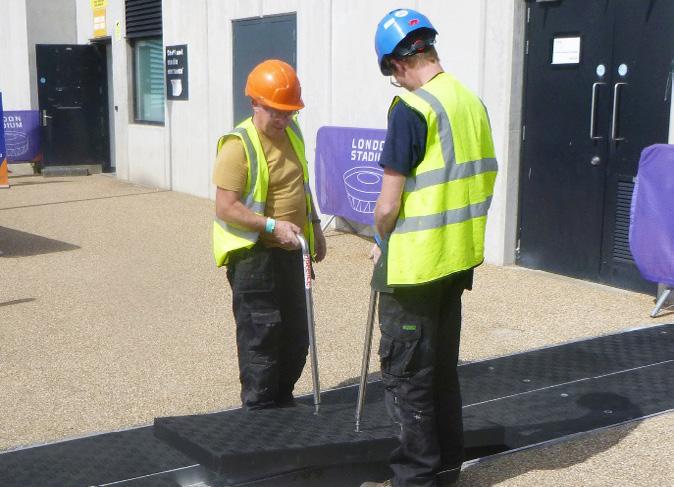
KPS piping installed at Chinese data centre for leading tech brand
In many instances where Fibrelite access covers are adopted, companies choose to specify a bespoke option, custommanufactured to specific requirements including size, colour, load rating, fittings (e.g. securing systems) and moulded identification of below ground services. Fibrelite has also undertaken projects where they have designed and manufactured retrofit replacements for previously installed heavy concrete or metal access covers.
“We are proud to be involved in data centre projects across the globe, with our Fibrelite trench access covers facilitating easy safe access to below ground infrastructure, and our KPS piping providing a reliable fuel supply to backup generators. In many cases, we actually custom design and engineer bespoke products to fit each facility’s requirements.”
Jo Stott, Marketing Director, OPW Global (a Dover company and parent company of Fibrelite and KPS)
Explore KPS’ technical case studies here

Explore Fibrelite’s technical case studies here
The age of the heat pump is now here
If you’ve been paying attention to the news about carbon reduction targets, you can’t have missed mention of heat pumps, the main message is clear: Heat pumps are here now, and they offer a viable solution to heating our homes in a low carbon way that will help tackle climate change.
The UK was the first major country to make it law that greenhouse gas emissions will be net-zero by 2050. When you consider 15% of our total emissions comes from heating our homes, it’s easy to see why this is a major focus. To help achieve this, the government has announced that it is banning gas and oil-fired boilers in all new build homes from 2025.
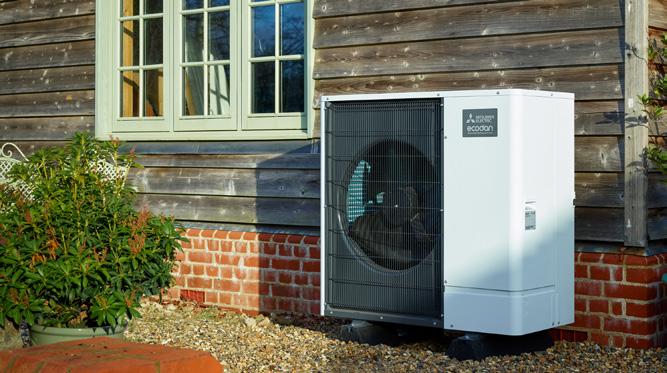
And this is where heat pumps can really help!
Objective
The Observer ran an article “Warmth from the earth and air: could heat pumps replace our gas boilers?”
Gas and oil lobby are fighting to show that they can remain viable in a low carbon economy and heat pumps are a real threat to their dominance in the heating industry. It’s also worth noting those parties pushing Hydrogen as part of the solution, also seem to be running an ‘anti-heat pump’ message. Yet there remain questions about the carbon intensive production needed for this hydrogen technology and, if it can work on the scale needed, it’s at least 10 years away – we simply don’t have the time! Stumbling blocks The article focuses on three main stumbling blocks that are stopping heat pumps becoming mainstream: The upfront costs; the low levels of insulation; and bad press from faulty or lowquality installations. When it comes to effective use of heat pumps, of course you need to choose a quality brand, but equally important is the design, installation, commissioning, and control of the system – and this is where training is the key. The Heat Pump Association has set up a new programme to help train up to 40,000 installers each year and Mitsubishi Electric have also introduced online learning to make training easier, cheaper and more accessible. A major part is educating the homeowner so that they get used to the different way heat pumps work, but this is also where the best systems have automated controls to ensure they work correctly.
Upfront costs
Heat pumps are still more expensive than gas boilers, but gas has been the dominant method of heating for over 70 years and heat pumps have been around just over a decade. The sooner we grow the installer base and produce ten times more heat pumps a year, then the costs will come down for installation.
But even before installation prices start to drop, there is one area where heat pumps win hands down, and that is over oil heating. Installation costs for electric heat pumps are comparable or even lower than a new oil boiler and the running costs offer a serious reduction in annual bills over oil.
Insulation
Heat pumps will work most effectively in a highly insulated property; however, they can work well in even the most basic of homes.
Heat pumps can work alongside an existing gas or oil boiler with the intelligent control system able to work out when to switch over from the heat pump to the other system. So, regardless of any plans the government may or may not have to help improve insulation in homes, heat pumps offer a viable alternative to the carbon-intensive systems that really are ‘costing us the earth’. Russell Dean – Mitsubishi Electric’s Head of Residential Heating and Ventilation

